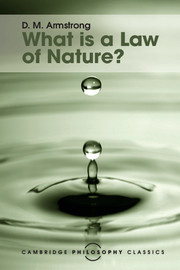Book contents
- Frontmatter
- Dedication
- Contents
- Preface to this edition
- Acknowledgements
- Part I A critique of the Regularity theory
- Part II Laws of nature as relations between universals
- 6 Laws of nature as relations between universals
- 7 Functional laws
- 8 Uninstantiated laws
- 9 Probabilistic laws
- 10 Further considerations concerning the form of laws
- 11 Are the laws of nature necessary or contingent?
- Conclusions
- Works cited
- Index
11 - Are the laws of nature necessary or contingent?
from Part II - Laws of nature as relations between universals
Published online by Cambridge University Press: 05 July 2016
- Frontmatter
- Dedication
- Contents
- Preface to this edition
- Acknowledgements
- Part I A critique of the Regularity theory
- Part II Laws of nature as relations between universals
- 6 Laws of nature as relations between universals
- 7 Functional laws
- 8 Uninstantiated laws
- 9 Probabilistic laws
- 10 Further considerations concerning the form of laws
- 11 Are the laws of nature necessary or contingent?
- Conclusions
- Works cited
- Index
Summary
Suppose it to be granted that laws of nature, if underived, are irreducible relations between universals. Should those relations be thought of as holding necessarily? Must they obtain ‘in every possible world’? Suppose that event a precedes event b by a certain interval of time. This is a first-order state of affairs having the form R(a,b). It would be generally conceded that this state of affairs might have been other than it is. But suppose that we ascend to a second-order state of affairs, to a law of nature N(F,G). Here, it may be argued, we have a state of affairs which could not be other than it is.
In what follows I shall argue, on the contrary, that N(F,G) and R(a,b) are both contingent states of affairs.
The obvious objection to the view that a true statement of a law of nature, such as ‘N(F,G)’, is a necessary truth is that it is discovered to be true a posteriori, using the method of hypothesis, observation and experiment. By contrast, the necessary truths of logic and mathematics are, in general at least, established a priori, by thought, reason and calculation alone.
This argument is not conclusive. The distinction between truths known, or rationally believed, a posteriori and those known, or rationally believed, a priori, is an epistemological one. Kripke has raised the question why it should determine the logical status of the truths known, or rationally believed.
Nevertheless, in trying to discover the laws of nature, scientists feel free to consider possibilities in a very wide-ranging manner, quite unlike the constraints which naturally suggest themselves in logical and mathematical argument. It would have to be admitted, at the least, that the laws of nature give a definite impression of contingency. The onus of proof would therefore appear to be on those who maintain that the impression is mere illusion.
Arguments for the necessity of laws
It may be, however, that this onus can be reversed. A traditional Rationalist line of thought here, put to me by Martin Tweedale, is to appeal to the Principle of Sufficient Reason. If a law such as N(F,G) is a mere contingent fact, then there is no sufficient reason why Fs should be Gs, rather than something else. But there ought to be such a reason.
- Type
- Chapter
- Information
- What is a Law of Nature? , pp. 148 - 160Publisher: Cambridge University PressPrint publication year: 2016



